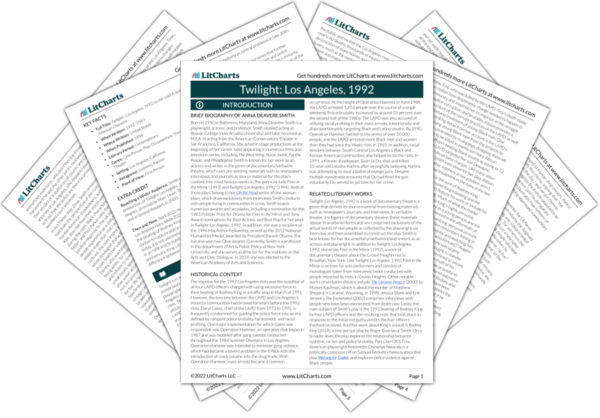Welcome to the LitCharts study guide on Anna Deavere Smith's Twilight: Los Angeles, 1992. Created by the original team behind SparkNotes, LitCharts are the world's best literature guides.
Twilight: Los Angeles, 1992: Introduction
Twilight: Los Angeles, 1992: Plot Summary
Twilight: Los Angeles, 1992: Detailed Summary & Analysis
Twilight: Los Angeles, 1992: Themes
Twilight: Los Angeles, 1992: Quotes
Twilight: Los Angeles, 1992: Characters
Twilight: Los Angeles, 1992: Terms
Twilight: Los Angeles, 1992: Symbols
Twilight: Los Angeles, 1992: Theme Wheel
Brief Biography of Anna Deavere Smith

Historical Context of Twilight: Los Angeles, 1992
Other Books Related to Twilight: Los Angeles, 1992
- Full Title: Twilight—Los Angeles, 1992: on the road: A Search for American Character
- When Written: 1992–1993
- Where Written: United States
- When Published: 1994
- Literary Period: Contemporary
- Genre: One-Person Play, Documentary Theater, Verbatim Theater
- Setting: Los Angeles, California
- Antagonist: Systemic Racism
- Point of View: First Person
Extra Credit for Twilight: Los Angeles, 1992
Reaching a Wider Audience. Smith performed a filmed production of Twilight: Los Angeles, 1992 entitled Twilight: Los Angeles, directed by Marc Levin. The production aired on PBS and in limited theaters in 2000.
Then and Now. April 2022 marked the 30th anniversary of the Los Angeles riots, while 2021 marked the 30th anniversary of the beating of Rodney King. While it was an anomaly for a civilian to capture police violence on camera in the 1990s, today, it is not uncommon due to the prevalence of cell phones. In an NPR article published to commemorate the riots’ anniversary, King’s daughter, Lora King, has stated “the only difference between back then and now is hashtags.”







